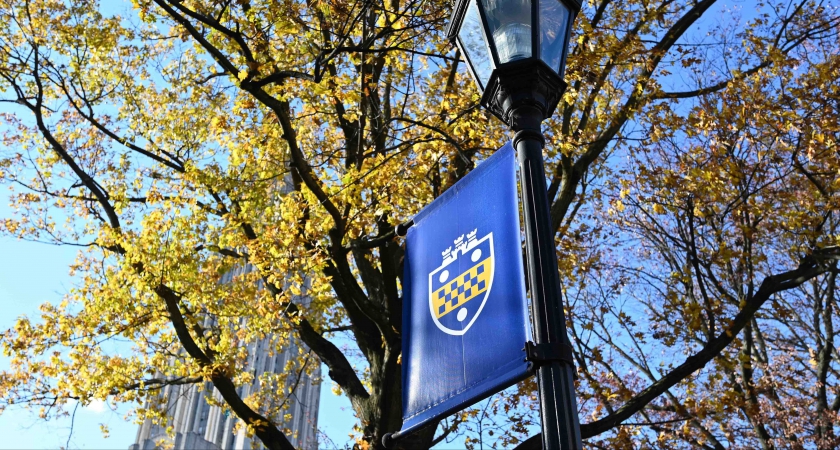By SHANNON O. WELLS
If building innovative approaches to ROTC programs and military studies are any measure, Pitt has more than usual to celebrate when Veterans Day 2025 comes around on Nov. 11.
This academic year, the University introduced two new minors, military science and aerospace studies — the former in its Army program and the latter through Pitt’s Air Force ROTC program — to enhance its academic-based military training and leadership development offerings.
VETERANS DAY
The Pitt–Greensburg campus holds a week of activities to mark Veterans Day, including a wreath-laying ceremony and luncheon on Nov. 11. Find details here.
The Office of Veterans Services will also host a luncheon on Nov. 11 at Posvar Hall.
Both minors cater to students seeking government-based careers at agencies such as Homeland Security, NASA, CIA, the U.S. State Department, as well as with their partners in the private sector.
Lt. Col. Stephen Lucas, professor of military science in the Division of Student Affairs, described development of the military science and aerospace studies minors as a combined effort among the Army and Air Force ROTC programs, the College of General Studies (CGS) and the History Department.
“The military science minor had been a longstanding goal for the Army ROTC,” he said. “For years, Pitt only granted one credit hour for each military science class, which made it impossible to build a true academic minor through ROTC instruction alone.”
Lucas credits the efforts of Jon Zito, Student Affairs program coordinator, through the Dietrich School of Arts and Sciences and CGS, as the “turning point” in establishing the minor studies programs.
Zito clearly communicated the rigor and workload of the courses, Lucas said, to Adriana Helbig, associate dean of undergraduate studies in the Dietrich School and CGS, “who helped secure approved credit hours that reflected that effort.”
With Helbig’s support, the “door finally opened for a legitimate minor,” Lucas explained. “(Zito) immediately reached out to the Air Force to bring them in as partners so both programs could share in the success and have their cadets’ hard work formally recognized.”
Behind the battle
A 19-credit minor offered by the Army ROTC program and housed in CGS, military science provides undergraduate students a “unique opportunity to explore military leadership, decision-making, and national defense,” its course description explained.
Covering key topics in military science, leadership and army operations, the course explores areas including the structure and roles of the U.S. Army, including ranks and responsibilities, along with basic leadership and teamwork skills.
The program is designed to help students build real-world skills that support both professional and personal growth. It’s considered to “pair well” with majors like political science, history, criminal justice, business, and other fields that involve leadership, planning and teamwork.
Students will participate in physical fitness training and weekend leadership labs as well as take part in a “staff ride”: touring a battlefield to learn about the tactics, leaders, consequences and outcomes from the battle.
To pursue the minor, students must be enrolled in Pitt’s Army ROTC Program and working toward commissioning as a second lieutenant in the U.S. Army.
Pitt, Lucas observed, joins many other institutions with ROTC programs in adding minors like military science and aerospace, while also inspiring others.
“Getting ours approved helps Pitt stay competitive because it shows we value the academic side of military training,” he said. “Pitt leading the way also encouraged Duquesne and Robert Morris Universities — both under our ROTC umbrella — to start their own military science minors.”
With about 170 cadets enrolled across all area ROTC-affiliated schools and around 90 students at Pitt, Lucas and his colleagues are working to open the minor beyond ROTC so other students interested in public service or government can get involved.
Building knowledge and experience
Offered by Air Force ROTC Detachment 730, the 19-credit aerospace minor provides undergraduate students an opportunity to explore areas including military structure, leadership, national defense and organizational management.
In complementing majors such as history, political science, criminal justice, business and fields involving advanced technology, the program is designed to build “real-world skills” — teamwork, “followership,” decision making and problem-solving among them — to prepare students for future professional and personal success, its course description explained.
Students must be currently enrolled in the Air Force ROTC program to pursue this minor while completing their commissioning requirements.
Lucas characterizes Pitt’s approach to ROTC and military studies as adaptable, dynamic and ultimately applicable to a range of career fields and life pursuits.
“Like any profession, success in the military starts with building a strong foundation of knowledge,” he said. “We use these military fundamentals when we lead others. Those basics don’t really change, but how we apply them does.
“As technology and the world around us evolve, we adapt those core skills to new challenges and opportunities. In ROTC, we teach leadership through a military lens. Ensuring our cadets understand Army doctrine allows us to teach them to how to think, adapt and lead in any situation.”
In addition to Adriana Helbig, Lucas credits development of the new minors through the “guidance and support” of Derek Fischer, senior director for undergraduate studies and CGS; Boryana Dobreva, CGS director of online learning; John Boonstra, CGS teaching assistant professor; and Michel Gobat, professor and chair in the Department of History.
“It’s been years in the making,” Lucas noted of the expanded offerings. “But now cadets in both Army and Air Force ROTC programs have a clear path to earn a minor in what they’re already dedicating so much time and effort to.”
Shannon O. Wells is a writer for the University Times. Reach him at shannonw@pitt.edu.
Have a story idea or news to share? Share it with the University Times.
